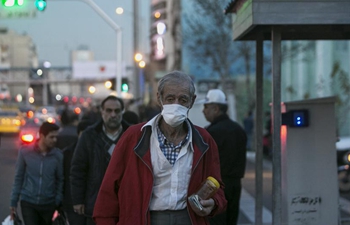PHNOM PENH, Dec. 17 (Xinhua) -- A new fish-based wafer snack - Nutrix, produced to treat severe acute malnutrition in children, was launched in Cambodia on Monday, according to a joint statement.
Nutrix has been developed by the United Nations Children's Fund (UNICEF), the French National Research Institute for Sustainable Development, Copenhagen University and Danish Care Foods, in collaboration with the Cambodian government, the joint statement said.
At the launch of the Nutrix production site in Phnom Penh, the partners announced that the ready-to-use-therapeutic food will be produced at scale, to address malnutrition in children in Cambodia, it said.
"The launch of the local production of this innovative therapeutic food marks an important step towards reaching the government's goal to treat at least 25,000 children with severe acute malnutrition per year," Cambodian Minister of Health Mam Bunheng said.
"The start of the production will help ensure that a local commodity to treat severe acute malnutrition is available," he said. "Over the last five years, many partners have supported us to develop this product and we are hopeful that this new partnership will help us reach more children with severe acute malnutrition treatment."
Approximately 2.6 percent of children in Cambodia are diagnosed with severe acute malnutrition, the statement said, adding that to treat them, home-based ready-to-use therapeutic foods are prescribed as a treatment and without these, many children may need to be hospitalized.
Wivina Belmonte, UNICEF deputy regional director to East Asia and Pacific, said in East Asia and Pacific, over five million children under the age of five are affected by severe acute malnutrition annually, which is a major cause of death in children under five.
"Ending severe acute malnutrition is challenging and requires social and political will," she said. "The Cambodian government should be congratulated for prioritizing this issue and for strengthening treatment in all settings. Cambodia joins one of two countries in the region to produce its own ready-to-use therapeutic food."
As an affordable snack-like therapeutic food, the Cambodian government can provide Nutrix to treat severe acute malnutrition in children under the age of five in remote and poor communities through local health facilities, the statement said.
It is estimated that in Cambodia, between 60,000 to 90,000 children need specialized medical treatment annually, including therapeutic food, it added.
According to the statement, well-known ready-to-use therapeutic foods made with peanut and dairy are imported into Cambodia. However, ingredients in Nutrix are locally sourced which makes it 20 percent cheaper to produce.
"By using a product adapted to local taste and local preferences we can make a real impact on malnutrition in Cambodia," said Frank Wieringa from the French National Research Institute for Sustainable Development.
"This is important because besides the 2.6 percent of children with severe acute malnutrition, another 8 percent of children suffer moderate acute malnutrition in Cambodia, which is a staggering number," he said.













